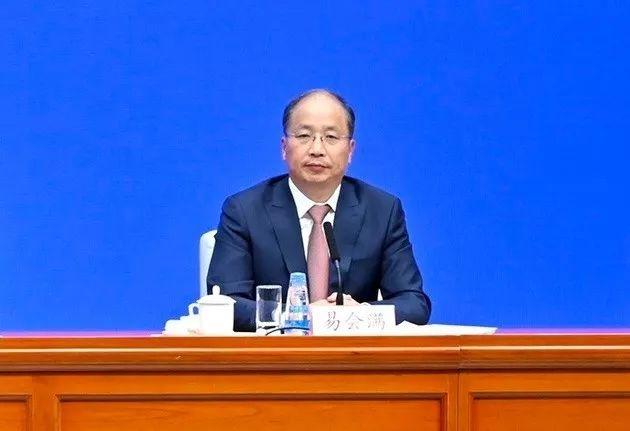New chief of securities market regulator faces daunting tasks, pressing issues to ensure stability

Yi Huiman (Xinhua File Photo)
As Yi Huiman, the former chairman of Industrial and Commercial Bank of China (ICBC), assumes his new post as the chairman of the China Securities Regulatory Commission (CSRC), he faces a web of daunting tasks ahead.
For starters, the Chinese equity market is hovering around the lowest levels in years as jittery investors grapple with grim economic outlook and ongoing policy and regulatory changes. Then there are the deeper systemic issues regarding laws and regulations.
Also, there are a series of reform and opening-up measures designed by the top leadership to address these issues to be implemented.
Yi, who rose through the ranks to become the head of the world's largest bank by assets and has spent more than three decades at ICBC, was appointed on Saturday to replace Liu Shiyu as the new CSRC chairman, capping off the latter's nearly three-year tenure at China's top stock market regulator, during which time he markedly tightened regulations, adopted some controversial policies and failed to push through reforms such as registration-based initial public offering applications.
Mixed reactions
Yi's appointment mostly garnered positive reactions among market insiders and inside the commission, although some expressed skepticism about the longtime banking executive's knowledge of stock market regulations.
Investors have not had the chance to respond to the announcement yet as markets were closed for the weekend.
"It is a matter of universal celebration," a source close to the commission told the Global Times on condition of anonymity.
Many had questioned Liu's lack of regulation expertise, the source noted, and his inability to reform the market under pressure. Liu was chairman of the Agricultural Bank of China before his appointment to the commission chairmanship in February 2016.
On Saturday he moved to become deputy Party chief at the lesser-known All-China Federation of Supply and Marketing Cooperatives, a State-owned distributor of products that played a key role in the planned economy before the late 1980s and still plays a major role in supplying goods in the country's vast of rural areas.
During Liu's tenure, the Chinese stock market saw persistent turbulence with the benchmark Shanghai Composite Index rising from 2,888.60 to as high as 3,587.03 before falling back. At Friday's market close, the index stood at 2,601.72, near the lowest level since November 2014.
With the equity market at the bottom, investors tend to welcome changes as they hope for fresh momentum, according to Li Daxiao, chief economist at Shenzhen-based Yingda Securities.
"A new boss means a new climate," Li said. "That's good news for market sentiment when the market is not doing well."
All three of Yi's predecessors were heads of China's top State-owned banks, leading some to question the decision to pick another banking executive.
"Why not consider someone from securities firms? If you have never been in this business, how could you be a professional?" said the source.
Daunting tasks
Yi faces a slew of challenges from improving investor confidence to deepening reform and opening-up, Chinese analysts said.
"All the challenges Liu has encountered will also be met by Yi," said Dong Shaopeng, deputy managing editor of Securities Daily and an expert adviser for the CSRC.
One of the pressing issues immediately facing Yi is how to improve investor confidence in the stock market. "Many will watch closely what he will do to reassure investors at such a low moment," Dong said.
Yi also faces thornier long-standing issues regarding sales of lockup shares, and laws and regulations: Many shareholders unload their lockup shares immediately after they become sellable, seriously hurting market confidence.
"Inadequate laws and regulations to protect the rights of investors, many of whom are individual investors, is another weak point that needs to be addressed by Yi," said Li, the Shenzhen economist.
China has been revising its securities, corporate and criminal laws to protect investors' rights. "He will need to push forward those efforts but they are not easy," Li said. Yi also must focus on implementing reform and opening-up, the top priority for the country's top leadership, analysts said.
This year Yi will oversee the launch of a new technology innovation board with a registration-based IPO application system to replace the current approval system.
He must also supervise the launch of a stock connect between the Shanghai and London stock bourses, which would allow more foreign capital into the Chinese market. The Chinese mainland already has two stock connects with Hong Kong: Shanghai, which started in 2014, and Shenzhen, launched in 2016.
During this process Yi will also have to find more channels to attract foreign capital while at the same time containing risks, analysts say.
"The two hardest jobs in China are the [chairman of the CSRC] and the head coach of the Chinese Football Association… they don't have enough authority to prevent storms but they face high expectations," wrote online commentator Shi Shusi on China's Twitter-like Weibo on Sunday.


 +86-13460933678
+86-13460933678